形容词和副词(3)
形容词与副词的区别与用法
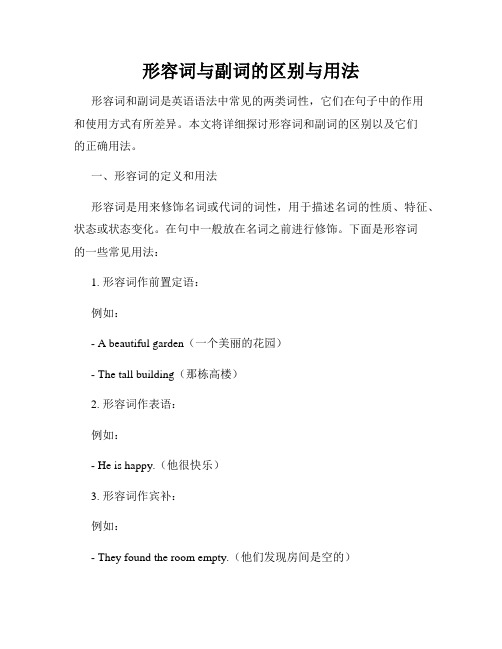
形容词与副词的区别与用法形容词和副词是英语语法中常见的两类词性,它们在句子中的作用和使用方式有所差异。
本文将详细探讨形容词和副词的区别以及它们的正确用法。
一、形容词的定义和用法形容词是用来修饰名词或代词的词性,用于描述名词的性质、特征、状态或状态变化。
在句中一般放在名词之前进行修饰。
下面是形容词的一些常见用法:1. 形容词作前置定语:例如:- A beautiful garden(一个美丽的花园)- The tall building(那栋高楼)2. 形容词作表语:例如:- He is happy.(他很快乐)3. 形容词作宾补:例如:- They found the room empty.(他们发现房间是空的)4. 形容词作定语补足语:例如:- I am sure she is right.(我相信她是对的)二、副词的定义和用法副词是修饰动词、形容词、其他副词、句子或句子成分的词性。
副词可以表示时间、地点、方式、程度、原因等各种概念。
下面是副词的一些常见用法:1. 副词修饰动词:例如:- He runs quickly.(他跑得很快)- She speaks fluently.(她讲得很流利)2. 副词修饰形容词或其他副词:例如:- The house is very beautiful.(房子非常漂亮)- He speaks quite softly.(他说话非常轻声细语)3. 副词修饰句子或句子成分:例如:- Unfortunately, I can't attend the meeting.(不幸的是,我不能参加会议)- She arrived late.(她到达得很晚)三、形容词和副词的比较尽管形容词和副词有一些相似之处,但它们在用法上有一些明显的区别。
1. 修饰词性不同:形容词修饰名词,描述名词的性质或状态;副词修饰动词、形容词或其他副词,表示时间、地点、方式、程度等。
2. 位置不同:形容词一般放在名词前面,修饰名词;副词一般放在动词、形容词或其他副词之后,修饰它们。
形容词与副词的区别与变化规则
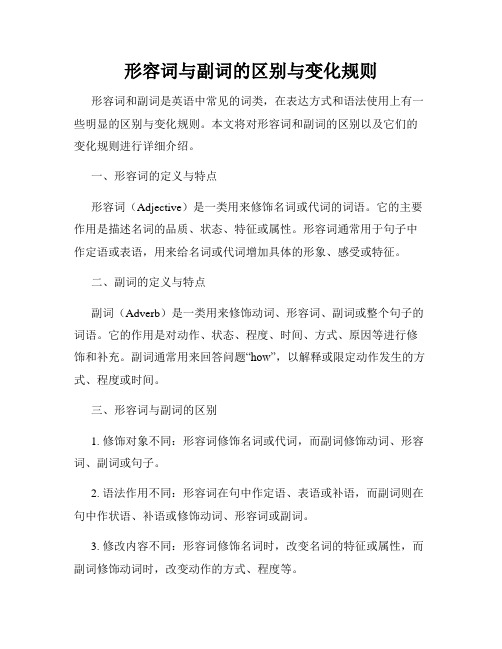
形容词与副词的区别与变化规则形容词和副词是英语中常见的词类,在表达方式和语法使用上有一些明显的区别与变化规则。
本文将对形容词和副词的区别以及它们的变化规则进行详细介绍。
一、形容词的定义与特点形容词(Adjective)是一类用来修饰名词或代词的词语。
它的主要作用是描述名词的品质、状态、特征或属性。
形容词通常用于句子中作定语或表语,用来给名词或代词增加具体的形象、感受或特征。
二、副词的定义与特点副词(Adverb)是一类用来修饰动词、形容词、副词或整个句子的词语。
它的作用是对动作、状态、程度、时间、方式、原因等进行修饰和补充。
副词通常用来回答问题“how”,以解释或限定动作发生的方式、程度或时间。
三、形容词与副词的区别1. 修饰对象不同:形容词修饰名词或代词,而副词修饰动词、形容词、副词或句子。
2. 语法作用不同:形容词在句中作定语、表语或补语,而副词则在句中作状语、补语或修饰动词、形容词或副词。
3. 修改内容不同:形容词修饰名词时,改变名词的特征或属性,而副词修饰动词时,改变动作的方式、程度等。
四、形容词的变化规则1. 基本形式:形容词的基本形式一般是原级(原形),如“big”。
2. 比较级(比较形式):形容词在比较级中加“-er”,如“bigger”。
在一些特殊情况下,形容词的比较级会发生规则变化,如“good”变为“better”、“bad”变为“worse”等。
3. 最高级(最高形式):形容词在最高级中加“-est”,如“biggest”。
同样地,一些形容词在最高级中会有规则变化,如“best”、“worst”。
五、副词的变化规则1. 基本形式:大多数副词的基本形式与形容词相同,只是作用不同,如“loud”(形容词)和“loudly”(副词)。
2. 比较级和最高级:大多数副词的比较级和最高级都是在前面加“more”和“most”,如“more slowly”、“most beautifully”。
形容词副词3
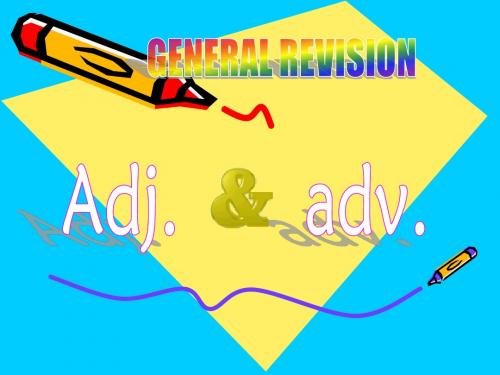
当形容词修饰由some-,any-,no-,every构成的不定代词时,形容词要放在这些 不定代词的之后. e.g.
however, etc.
关系副词 where, why, how when,
neithe r
maybe, perhaps, certainly,
almost, -ly结尾 hardly, as long as 等, even, all, a little, a bit 的副词
用
法
例
句
作表语 My mother is out . 作定语 The girl there is my friend. 作状语 He runs fast .
once, soon, just, usually,
tonight, long, already, yet, before, ago, later, ever since after, whenever first, someday, sometime, last, often,
how, so,
fast,
形容词和宾语一起构成复合宾 语.e.g. We must
keep the classroom clean.
He made us happy. Colour it green.
Let’s fill in the blanks,
taller harder tallest 比较 hardest 原级 最高 词 尾 变 化 larger wider largest级 widest 级 biggest bigger hotter tall hard 单音节词在词尾加-er(比较级)或hottest fattest fatter wetter wide est(最高级)以字母e接尾的词加-r 或- large wettest happiest st happier drier driest earliest big hot 以重读闭音节结尾的词末尾只有一 earlier 个辅音字母应双写辅音字母再加er thin fat wet narrowest 或est most difficult narrower cleverest dry 以辅音字母+y结尾的词变为i再加-er, happy most popular cleverer early more difficult 或-est most slowly narrow more popular 少数以-er,-ow结尾的双音节 clever more slowly 词可加-er或-est
形容词和副词的用法

形容词和副词的用法 It was last revised on January 2, 2021形容词和副词的用法作用:1.形容词:(1)形容词在句中常修饰名词和代词。
A good boy. Something important(2)形容词在句中作定语、表语、宾语补足语。
Our country is a beautiful country. (作定语)The meal is delicious. (作表语)We keep our classroom clean and tidy. (作宾语补足语)2.副词:(1)副词在句中修饰动词、副词、形容词、全句(Luckily)。
She speaks English well. Luckily, I passed the exam.(2)副词在句中可作状语、表语、和定语。
He studies very hard. (作状语) When will you be back.(作表语)注意:常用来修饰原级的词有:very,too, so, really, quite, pretty等一、位置1.形容词:通常要放在所修饰的名词之前,但要放在不定代词(something、anything…)之后。
2.副词:1)多数副词作状语时放在行为动词之后。
如果动词带宾语,则放在宾语之后。
Mr. Smith works very hard. She speaks English well.2) 频度副词作状语时,通常放在行为动词之前,情态动词、be动词和助动词之后。
He usually gets up early. I am never late for school.3) 程度副词一般放在所修饰的名词前面。
He runs very fast.形容词和副词的比较级和最高级。
大多数形容词和副词有三个等级:原级、比较级、最高级。
原级指形容词和副词的原形;比较级用来表示“较……”或“更……一些”;最高级则表示“最……”一、形容词和副词的原级:1.表示两者(A与B)在某一方面相同时用句型:A + 谓语 + as + 形容词或副词的原形 + as+ B.eg: ① Tom 和 Sam 一样高。
形容词和副词的区别与用法
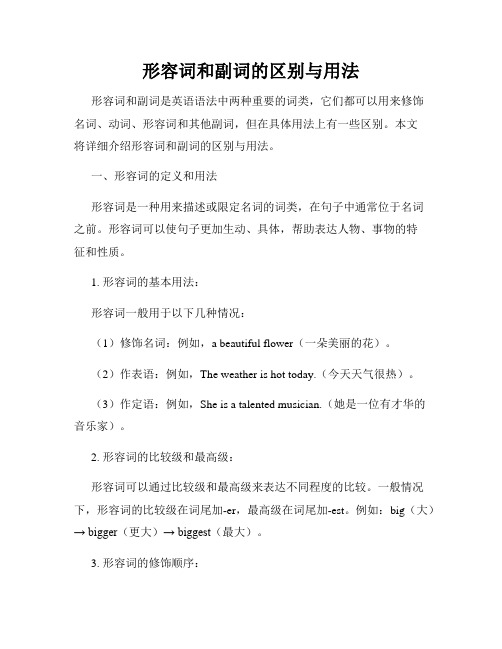
形容词和副词的区别与用法形容词和副词是英语语法中两种重要的词类,它们都可以用来修饰名词、动词、形容词和其他副词,但在具体用法上有一些区别。
本文将详细介绍形容词和副词的区别与用法。
一、形容词的定义和用法形容词是一种用来描述或限定名词的词类,在句子中通常位于名词之前。
形容词可以使句子更加生动、具体,帮助表达人物、事物的特征和性质。
1. 形容词的基本用法:形容词一般用于以下几种情况:(1)修饰名词:例如,a beautiful flower(一朵美丽的花)。
(2)作表语:例如,The weather is hot today.(今天天气很热)。
(3)作定语:例如,She is a talented musician.(她是一位有才华的音乐家)。
2. 形容词的比较级和最高级:形容词可以通过比较级和最高级来表达不同程度的比较。
一般情况下,形容词的比较级在词尾加-er,最高级在词尾加-est。
例如:big(大)→ bigger(更大)→ biggest(最大)。
3. 形容词的修饰顺序:多个形容词修饰同一个名词时,它们的顺序是有规律的。
通常,形容词的顺序是:冠词、观点或态度、大小、形状、年龄、颜色、国籍或来源、材料或用途、类别等。
例如:a beautiful small round glass bowl (一只漂亮的小圆玻璃碗)。
二、副词的定义和用法副词是一种用来修饰动词、形容词、其他副词和整个句子的词类,用来表达时间、地点、方式、程度等概念。
1. 副词的基本用法:副词可以用于以下几种情况:(1)修饰动词:例如,She sings beautifully.(她唱得很好听)。
(2)修饰形容词:例如,The movie is extremely interesting.(这部电影非常有趣)。
(3)修饰其他副词:例如,He speaks very slowly.(他说话非常慢)。
2. 副词的比较级和最高级:和形容词类似,副词也可以通过比较级和最高级来表达不同程度的比较。
英语八年级上册Unit3形容词与副词比较级
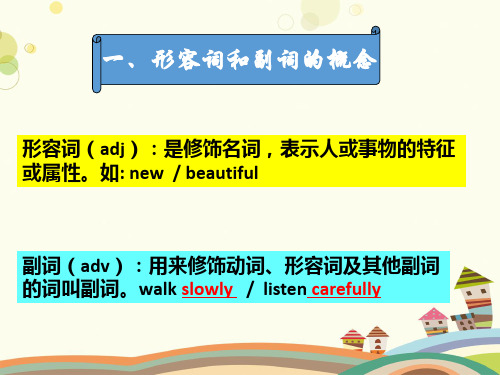
疑问副词 how, when, where, why
连接副词 however, how, when, where, why
more exciting most exciting
一、形容词原级的比较。 as +原级+as表“和……一样”的意思; not as/ so ……as
表“不如”或“不一样”。
1.The book is ___a_s_n_e_w__a_s that one.(一样新) 2.My bike is ___n_o_t_a_s__/_s_o_g_o_o_d__a_s_ yours.(不如…好)
以辅音字母结尾 双写辅音字母, thin-thinner-thinnest 的重读闭音节词 再加-er ,-est big-bigger-biggest
多音节和部分双 在词前加 more ,slowly,more slowly del
音节单词
most
more delicious most d
注意:以ing ,ed和 ly结尾的词在其前加more (the) most
加 –r ,-st
tall-taller-tallest small-smaller-smallest
nice-nicer-nicest large-larger-largest
以“辅音+y”结 尾的词
变y为i再加-er -est
,
dry-drier-driest happy-happier-happiest heavy-heavier-heaviest
英语形容词和副词

• He had worked hard all his life .(修饰动词) • He is very diligent.(修饰形容词)
• You can find books on that subject quite easily .(修饰副词)
• Luckily she was in when I called .(修饰句 子)
如: • The desk is clean .
3.作宾语补足语,用在cut, find, keep, leave, make, push, tear等动词之 后。如:
• The news made everyone happy.
• 4.与定冠词一起表示某一类人或物, 如: • The rich and the poor live very different
• Surely you don’t think she’s beautiful? • 你一定觉得她不漂亮吧? • 有些时间副词和频度副词也可放在句首,
• 这类词有yesterday, tomorrow, last night,
• finally, at last, now, soon, once, occasionally, • usually, sometimes等。如:
2.作表语,与系动词连用。只作表语,ill, well, content, unable, sorry, glad, mindful, exempt, bound, bent, afraid, ashamed, asleep, awake, away, aware, alike, alive, alert, averse, agape, astir, aflame, afloat, afire.(还有其他以a开头的词)
常见的形容词和副词

常见的形容词和副词在我们的日常生活和写作中,形容词和副词是非常常见且有用的词汇。
它们可以丰富我们的表达,使语言更加生动和精准。
本文将介绍一些常见的形容词和副词,并探讨它们的用法和作用。
一、表示人性格和外貌的形容词1. 年轻的:指某人年龄较轻,常用来形容青少年或拥有精力活力的人。
例句:她是一个年轻的教师,充满着热情和创造力。
2. 高大的:形容某人身材较高、较高大。
例句:他是一位高大的篮球运动员,高度让人畏惧。
3. 聪明的:形容某人智力较强。
例句:这个孩子非常聪明,很容易掌握新知识。
4. 可爱的:指某人或某物令人喜爱或具有吸引力。
例句:那只小猫非常可爱,大家都喜欢和它玩耍。
5. 慷慨的:形容某人乐于助人,愿意给予帮助或贡献。
例句:他慷慨地捐赠了一大笔善款用于救助灾区的人们。
二、表示程度和频率的副词1. 非常:表示程度很高,可以用来修饰形容词或动词。
例句:这本书非常有趣,我一下午都沉浸其中。
2. 比较:表示进行比较,程度中等。
例句:他的成绩比较好,但还有进步的空间。
3. 很少:表示频率很低,事情发生的可能性小。
例句:我很少去夜店,更喜欢在家里安静地阅读。
4. 经常:表示频率较高,事情发生的可能性大。
例句:他经常去健身房锻炼身体,保持健康和身材。
5. 快速地:表示某个动作迅速进行,速度很快。
例句:他快速地跑向终点,赢得了比赛的冠军。
三、表示时间和地点的副词1. 现在:表示当前的时间。
例句:我们现在正在开会,过一会儿就开始讨论下一个项目。
2. 早上:表示上午的时间段。
例句:我喜欢早上跑步,清新的空气让我感到宁静和活力。
3. 那里:表示某个地方的位置。
例句:我想去海边度假,那里的风景一定很美。
4. 这里:表示说话人所在的地方。
例句:欢迎大家来参观我们的展览,这里展示了许多珍贵的艺术品。
5. 外面:表示某个地点或房间之外。
例句:外面下着大雨,我们最好待在室内不出门。
四、表示感情和态度的形容词1. 开心的:形容某人感到愉快、快乐。
形容词与副词的用法

形容词与副词的用法形容词(Adjective)和副词(Adverb)是英语中常见的词性,它们在句子中扮演着重要的角色。
形容词用来修饰名词,描述名词的性质或特征,而副词则用来修饰动词、形容词、副词等,并给出更详细的说明。
本文将从不同的角度探讨这两个词性在句子中的用法。
1. 形容词的用法形容词常用于以下几种情况:(1) 修饰名词形容词可以修饰名词,起到描述名词特征的作用。
例如:- 美丽的花朵在花园中怒放。
- 这个小男孩很聪明。
(2) 构成比较级和最高级形容词可以用来表示比较级和最高级。
在比较级中,我们通常在形容词后加上-er,而在最高级中加上-est,或者在形容词前加上more和most。
例如:- 这本书比那本书更有趣。
- 这是我见过的最美丽的风景。
(3) 作表语形容词可以用作表语,与主语连系动词一起说明主语的特征或状态。
例如:- 这个问题很困难。
- 我很高兴。
2. 副词的用法副词常用于以下几种情况:(1) 修饰动词副词可以修饰动词,表示动作的方式、程度等。
例如:- 他慢慢地走过了街道。
- 她轻轻地打开了门。
(2) 修饰形容词和副词副词也可以修饰形容词和副词,表示程度或者方式。
例如:- 这个女孩非常漂亮。
- 他们跑得很快。
(3) 修饰整个句子副词有时可以修饰整个句子,表示说话人的态度、观点或推测。
例如:- 显然,他是个天才。
- 或许,我们会成功。
总结:形容词和副词在英语句子中的用法多种多样,灵活运用它们可以使句子更加生动、精确。
形容词用来修饰名词,描述名词的性质或特征;而副词则用来修饰动词、形容词、副词等,并给出更详细的说明。
在写作中,我们应该注意正确使用形容词和副词,使句子表达更加准确、丰富。
形容词和副词的用法归纳
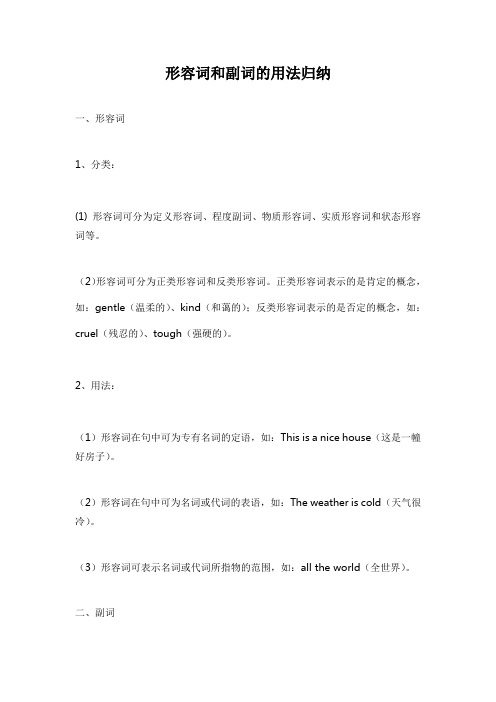
形容词和副词的用法归纳
一、形容词
1、分类:
(1) 形容词可分为定义形容词、程度副词、物质形容词、实质形容词和状态形容词等。
(2)形容词可分为正类形容词和反类形容词。
正类形容词表示的是肯定的概念,如:gentle(温柔的)、kind(和蔼的);反类形容词表示的是否定的概念,如:cruel(残忍的)、tough(强硬的)。
2、用法:
(1)形容词在句中可为专有名词的定语,如:This is a nice house(这是一幢好房子)。
(2)形容词在句中可为名词或代词的表语,如:The weather is cold(天气很冷)。
(3)形容词可表示名词或代词所指物的范围,如:all the world(全世界)。
二、副词
1、分类:
副词可分为时间副词、频率副词、程度副词、状语副词、方向副词、比较副词等。
2、用法:
(1)副词可修饰动词,如:They often go to school together(他们经常一起去上学)。
(2)副词可修饰形容词或其他副词,如:The sky is so beautiful(天空是如此美丽)。
(3)副词可修饰从句,如:He never believed that(他从不相信那件事)。
知识点形容词与副词总结
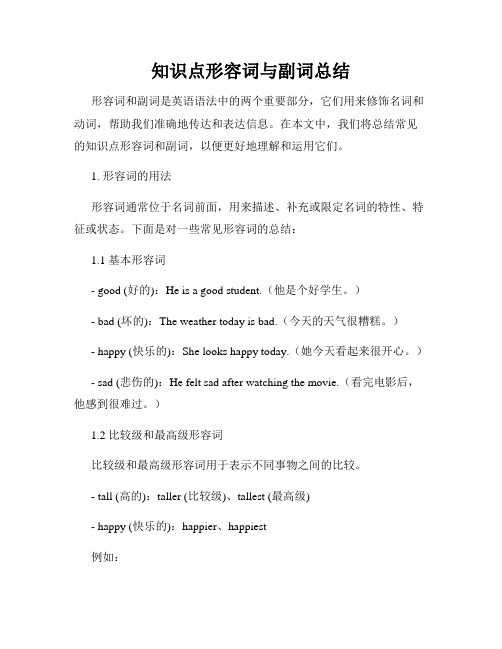
知识点形容词与副词总结形容词和副词是英语语法中的两个重要部分,它们用来修饰名词和动词,帮助我们准确地传达和表达信息。
在本文中,我们将总结常见的知识点形容词和副词,以便更好地理解和运用它们。
1. 形容词的用法形容词通常位于名词前面,用来描述、补充或限定名词的特性、特征或状态。
下面是对一些常见形容词的总结:1.1 基本形容词- good (好的):He is a good student.(他是个好学生。
)- bad (坏的):The weather today is bad.(今天的天气很糟糕。
)- happy (快乐的):She looks happy today.(她今天看起来很开心。
)- sad (悲伤的):He felt sad after watching the movie.(看完电影后,他感到很难过。
)1.2 比较级和最高级形容词比较级和最高级形容词用于表示不同事物之间的比较。
- tall (高的):taller (比较级)、tallest (最高级)- happy (快乐的):happier、happiest例如:- He is taller than his brother.(他比他的兄弟高。
)- She is the happiest person in the room.(她是房间里最快乐的人。
)1.3 泛指和特指形容词泛指形容词用于描述没有具体限制的事物,而特指形容词用于描述特定的事物。
- some (一些):He bought some apples.(他买了一些苹果。
)- this (这个):This book is interesting.(这本书很有趣。
)2. 副词的用法副词通常用来修饰动词、形容词或者其他副词,用来表达方式、时间、原因等。
2.1 副词修饰动词- slowly (慢慢地):He walks slowly.(他走得很慢。
)- quickly (快速地):She runs quickly.(她跑得很快。
形容词副词用法总结
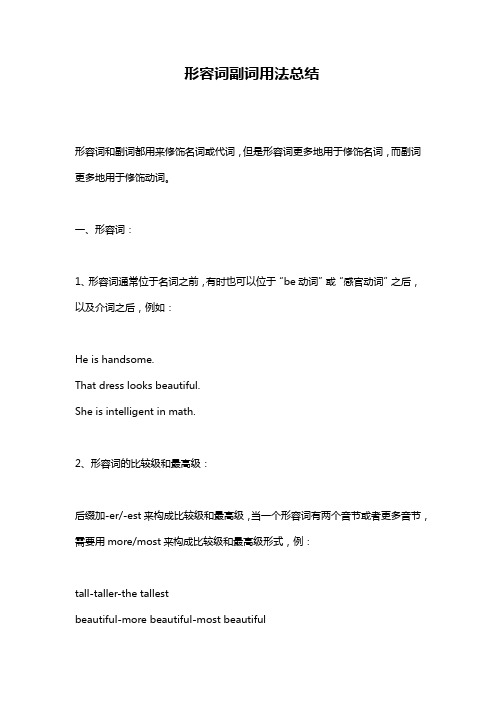
形容词副词用法总结形容词和副词都用来修饰名词或代词,但是形容词更多地用于修饰名词,而副词更多地用于修饰动词。
一、形容词:1、形容词通常位于名词之前,有时也可以位于“be动词”或“感官动词”之后,以及介词之后,例如:He is handsome.That dress looks beautiful.She is intelligent in math.2、形容词的比较级和最高级:后缀加-er/-est来构成比较级和最高级,当一个形容词有两个音节或者更多音节,需要用more/most来构成比较级和最高级形式,例:tall-taller-the tallestbeautiful-more beautiful-most beautiful3、形容词的反义词:具有反义关系的形容词可以直接用前缀un-来表示反义,例:happy-(un)-happy4、形容词的最高级的格式:形容词最高级的表达形式是“the +原级+ of/in +名词”,当名词前面提到的只有2个,可以不用of,例如:He is the tallest boy of the three.She is the prettiest girl in the class.二、副词:1、副词通常用来修饰整句,最常见的形式有“副词+动词”,例:She speaks quickly.2、副词的比较级和最高级:副词比较级和最高级一般通过-er和-est来构成,但也有些特殊情况,例如“good-better-best”;当副词有三个或者更多音节时,需要用more/most来构成比较级和最高级形式,例:carefully-more carefully-most carefully3、副词的最高级的格式:副词最高级的表达形式一般是“the +副词+ of/in +名词”,当名词前面提到的只有2个,可以不用of,例如:He runs the fastest of all.She dances the most beautifully in the party.。
形容词和副词有三个比较等级免费范文精选

形容词和副词比较级形容词和副词有三个比较等级,即:1. 原级,也就是原形。
2.比较级,表示“较”或“更”的意思。
(用于两者之间比较)3.最高级,表示“最”的意思。
(用于三者或三者以上的比较)首先,我们先来看看形容词、副词的比较级和最高级是如何构成的?1.单音节词和少数以-er, -ow结尾的双音节单词,比较级在后面加-er,最高级在后面加-est。
①单音节单词small→smaller→smallestshort→shorter→shortesttall→taller→tallestgreat→greater→greatest②少数以-er, -ow结尾的双音节单词clever→cleverer→cleverestnarrow→narrower→narrowest2.以不发音e结尾的单音节单词,比较级在原形后加-r,最高级在原级后加-st。
large→larger→largestnice→nicer→nicestable→abler→ablest3.以一个辅音字母结尾的闭音节(即:辅音+元音+辅音)单词中,形容词和副词比较级先双写末尾的辅音字母,比较级加-er,最高级加-est。
big→bigger→biggesthot→hotter→hottestfat→fatter→fattest4.以“辅音字母+y”结尾的双音节词,把y改为i,比较级加-er,最高级加-est。
easy→easier→easiestheavy→heavier→heaviestbusy→busier→busiesthappy→happier→happiest5.其他双音节词和多音节词,比较级在前面加more,最高级在前面加most。
beautiful→more beautiful→most beautifuldifferent→more different→most differenteasily→more easily→most easily6.有少数形容词、副词的比较级和最高级是不规则的,必须熟记。
3.形容词和副词的用法
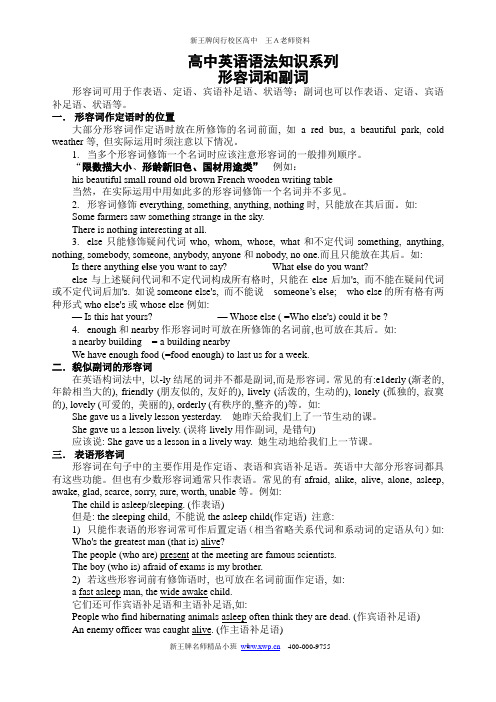
新王牌闵行校区高中王A老师资料高中英语语法知识系列形容词和副词形容词可用于作表语、定语、宾语补足语、状语等;副词也可以作表语、定语、宾语补足语、状语等。
一.形容词作定语时的位置大部分形容词作定语时放在所修饰的名词前面, 如 a red bus, a beautiful park, cold weather等, 但实际运用时须注意以下情况。
1.当多个形容词修饰一个名词时应该注意形容词的一般排列顺序。
“限数描大小、形龄新旧色、国材用途类”例如:his beautiful small round old brown French wooden writing table当然,在实际运用中用如此多的形容词修饰一个名词并不多见。
2.形容词修饰everything, something, anything, nothing时, 只能放在其后面。
如:Some farmers saw something strange in the sky.There is nothing interesting at all.3.else只能修饰疑问代词who, whom, whose, what和不定代词something, anything, nothing, somebody, someone, anybody, anyone和nobody, no one.而且只能放在其后。
如: Is there anything else you want to say? What else do you want?else与上述疑问代词和不定代词构成所有格时, 只能在else后加's, 而不能在疑问代词或不定代词后加's. 如说someone else's, 而不能说someone’s else;who else的所有格有两种形式who else's或whose else例如:— Is this hat yours? — Whose else ( =Who else's) could it be ?4.enough和nearby作形容词时可放在所修饰的名词前,也可放在其后。
形容词和副词的比较级和最高级(3)
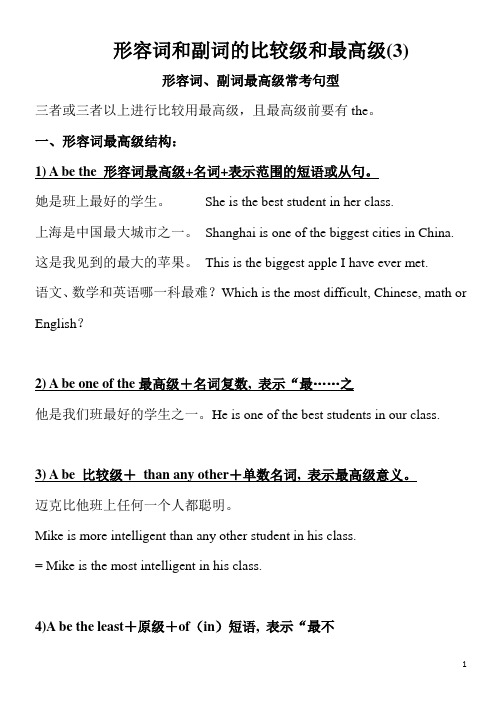
形容词和副词的比较级和最高级(3)形容词、副词最高级常考句型三者或三者以上进行比较用最高级,且最高级前要有the。
一、形容词最高级结构:1) A be the 形容词最高级+名词+表示范围的短语或从句。
她是班上最好的学生。
She is the best student in her class.上海是中国最大城市之一。
Shanghai is one of the biggest cities in China. 这是我见到的最大的苹果。
This is the biggest apple I have ever met.语文、数学和英语哪一科最难?Which is the most difficult, Chinese, math or English?2) A be one of the最高级+名词复数, 表示“最……之他是我们班最好的学生之一。
He is one of the best students in our class.3) A be 比较级+than any other+单数名词, 表示最高级意义。
迈克比他班上任何一个人都聪明。
Mike is more intelligent than any other student in his class.= Mike is the most intelligent in his class.4)A be the least+原级+of(in)短语, 表示“最不四本书中这本最没用。
This is the least useful of the four books.形容词最高级的修饰词形容词最高级前一般要加定冠词the, 也可以加形容词性物主代词、名词所有格;序数词,以及by far, nearly, almost等词语常可用来修饰形容词最高级。
如这是我最忙的一天。
This is my busiest day.长江是中国最长的河流。
The Yangtze River is Chinas longest river.这顶帽子几乎是最大的了。
副词与形容词的区别

副词与形容词的区别副词与形容词的区别(1)形容词可以以同样的意义做谓语,可以再加程度副词,有时还可做补语,副词不能。
如:A事情的发生很偶然?B这件事发生得太突然了。
"A中的"偶然"不能换成"偶尔"。
B中的"突然"不能换成"忽然"。
可见,"偶尔"、"忽然"是副词,"偶然"、"突然"·是形容词。
(2)形容词还可以以同样的意义修饰各词,副词不能。
例:c·突然事件,d·必然结果。
其中的"突然"不能换成"忽然","必然"不能换成“必定”或“必须”等。
(3)“白、老、净、怪、偏、直、硬”等,虽然既可做谓语义可做定语,也可做状语,但它们做谓语或定语时同做状语时,不能保持意义上的一致,试比较:“白的墙”和“白跑一趟”,“黄瓜老了”和“他老跑北京”,“道路很直”和“眼皮直跳”。
不难看出,每组词语中的两个“白”或两个“老”、“直”等,在意义上毫无联系,它们只是采用了同样的语音形式和书写形式而已,可见,放在动词和形容词前的“白、老、净、怪、偏、直、硬”等是副词。
副词和动词的区别(1)副词只做状语,而能做状语的动词还能做谓语并且意义不变。
如:“他连续工作了十小时”,其中的“连续”只做状语,而“继续”一词在“他们继续赶路”一句中做状语,在“你来继续我们的事业”一句中则做谓语(述语中心语),可见“继续”是动词。
(2)“没有”和“没”比较特殊,它们在动词和形容词前是副词做状语,否定行为、性状的发生,如“没有去”、“没有红”,“没去”、“没红”;在名词前是动词,带宾语,否定事物的存在或否定事物的领有,如“没有书”、“没书”。
副词与时间名词的区别时间名词可以做主语,还可以同介词组合成介词短语(词组),如“从前是什么样子?”“在过去”、“从过去到现在”。
形容词和副词的用法

形容词、副词复习【复习目标】▲明确形容词和副词的用法及其相互转换形式。
▲掌握常用形容词和副词的比较级和最高级的构成方法。
▲掌握少数形容词和副词的比较级和最高级的不规则变化。
▲掌握形容词和副词的比较等级用法。
一、形容词的定义及句法功能形容词是用来描写或修饰名词(或代词)的一类词。
形容词在句中主要用作定语、表语和宾语补足语。
1. 用作定语,修饰名词或代词。
(1)形容词修饰名词时,一般置于它所修饰的名词之前;如有若干形容词同时修饰一个名词时,它们的排列顺序较为固定,通常为:描绘形容词—特征形容词--(包括大小、长短、形状、新旧、年龄等)--颜色形容词。
例如:She has beautiful long curly blond hair. 她长着漂亮的金黄色长卷发。
Mary gave me a useful big brown wooden box. 玛丽给我一个实用的大的褐色木盒子。
A. enough 修饰名词时,既可以放在名词之前,也可以放在名词之后。
但多放在名词前。
例如:Don't worry, we have enough time/time enough to get there. 别着急,我们有足够的时间赶到那儿。
B.由连字符连接起来的复合形容词中的名词只能用单数形式。
例如:an eight-year-old boy 一个8 岁的男孩(2)形容词修饰由some,any,every,no 等构成的复合不定代词时,需后置。
例如:Will you please tell us something interesting? 你给我们说一些有趣的事好吗?There ' s nothing special in the bo盒子里没有什么特别的东西。
Anyone intelligent can do it. 任何有智力的人都能做这件事。
2. 用作表语,位于系动词之后。
初中阶段常用的系动词有:be, become, get, look, feel, smell, taste, sound, turn, seem, keep, grow 例:The park is very beautiful. 这座公园很美。
- 1、下载文档前请自行甄别文档内容的完整性,平台不提供额外的编辑、内容补充、找答案等附加服务。
- 2、"仅部分预览"的文档,不可在线预览部分如存在完整性等问题,可反馈申请退款(可完整预览的文档不适用该条件!)。
- 3、如文档侵犯您的权益,请联系客服反馈,我们会尽快为您处理(人工客服工作时间:9:00-18:30)。
形容词和副词一.形容词作用与位置1.形容词作定语。
He is a tall man.The red pencil is mine.It is a beautiful present.There is something wrong with the watch.Is there anything special?There is nothing new.总结:1. 形容词作定语修饰名词时,放在名词的前面。
2. 形容词作定语修饰不定代词something,anything,everything,nothing等时,放在代词的后面。
2.形容词作表语He is very strong.It is getting warm.The soup tastes delicious.What he said proved true.She fell asleep.总结:1) 常见系动词有:be,become, get ,turn, grow, go,keep ,remain, stay look,smell , taste, feel, sound, appear , seem ,prove2)有些成对出现的形容词:interesting/interested, surprising/surprised,exciting/excited, moving/moved例:The film was so moving that everyone was moved to tears.3.形容词作状语,表状况、原因、结果等。
He went to bed , cold and hungry.4.形容词作做宾补结构:主语+谓语+宾语+形容词(作宾补)Running in the morning makes him strong.We think the film really interesting.Who has left the door open?I found her asleep on the grass.1)请保持教室清洁。
2)我觉得这个故事很有趣。
3)她说的话让我很高兴。
二.副词1.副词的分类方式副词:well,fast,slowly,carefully,quickly程度副词:very,much,enough,almost,rather,quite地点副词:here,there,out,somewhere,abroad,home,时间副词:today,early,soon,now,then,recently,still频度副词:always,often,usually,sometimes,seldom,never否定副词:no,not,neither,nor,疑问副词:where,how,why其他:also,too,only2.副词的基本用法:副词是用来修饰动词、形容词、其他副词以及全句话的词类,表示时间、地点、程度、方式等概念。
例如:We should listen to our teachers carefully.He is very happy today.“What happened”I asked,rather angrily.In spring,I can see flowers everywhere.3.常见副词用法辨析①very,much和very much.的区别very用于修饰形容词或副词的原级;much用于修饰形容词或副词的比较级;修饰动词要用very much.例如,John is very honest.This garden is much bigger than that one.Thank you very much.②so与such的区别so修饰形容词或副词;such修饰名词,例如,My brother runs so fast that I can’t follow him.He is such a boy.so修饰的形容词后可以有一个单数的可数名词,其结构是“so+形容词+a/an+可数名词单数”.such可以修饰可数名词单复数和不可数名词,名词前可以有形容词作定语,其结构是“such+a/an+形容词+可数名词单数”,“such+形容词+可数名词复数/不可数名词”,.例如,He is so clever a boy.=He is such a clever boy.他是一个如此聪明的孩子。
It is such cold weather.这么冷的天气。
(正)It is so cold weather.(误)They are such good students.他们是那么好的学生。
(正)They are so good students. (误)三.形容词、副词比较级和最高级的构成1.比较级和最高级的规则变化:规则原级比较级最高级1.在词尾后直接加tall taller tallest-er/est2.词尾是e,只加nice nicer nicest-r/st3.以辅音字母加y结尾的,把y变ihappy happier happiest再加-er/est4.重读闭音节,末尾只有一个辅音字母,双写这个辅thin thinner thinnest音字母,再加-er/est5.其他双音节词或多音节词,在该词前面加-more/mostbeautiful more beautiful most beautiful6. 由形容词加ly构成的双音节词和多音节词都是在该词前加-more/most. quicklydifficultlymore quicklymore difficultlymost quicklymost difficultly2. 不规则变化:good/well better bestbad/badly worse worstmany/much more mostlittle less leastfar farther/further farthest/furthest 四.形容词比较级和最高级的用法1. 原级比较用于两者之间对比,意思为“……和……相同”Tom is as honest as Jack.Her skin is as white as snow.My dog is as old as that one.He is not as (=so) tall as I.The weather here is not as(=so)cool as the weather in Harbin.总结句型:2. 比较级的用法:1)A+形容词比较级+than+ BSusan is happier than Jane.His brother is younger than me.Beijing is more beautiful than Osaka.形容词比较级前还可以用much, even, still, a little,far, a lot, a bit, much more来修饰。
2)比较级+and+比较级,表示“越来越……”The earth is getting warmer and warmer.China becomes more and more stronger.3)the +比较级,the +比较级结构,表示“越……就越……”The more I study it, the more I like it.4)which/who +is +比较级Which city is bigger, Beijing or Tianjin?Who is happier, you or me?3. 最高级用法:用于三者及以上的人或事物的比较,最高级前加the,最高级前有物主代词,序数词和名词所有格时,不加定冠词,后面跟带in或of表范围的短语。
1)one of the +最高级Shanghai is one of the most beautiful cities in China.Our city is one of the safest cities in the world.It is our nearest neighbor in space.2)最高级意义的表达方法:形容词最高级的意义还可以用比较级形式表达。
常见的有:①形容词比较级+than any other+单数名词。
如:This is more difficult than any other book here.(=This is the most difficult book of all.)She is better than any other student in her class.②容词比较级+than the other+复数名词。
如:Asia is bigger than the other continents on the earth.亚洲是地球上最大的洲。
3)形容词最高级前可用序数词限定,共同修饰后面的名词,其结构为:“the+序数词+形容词最高级+名词”。
如:Hainan is the second largest island in China. 海南是中国的第二大岛。
五.副词比较级和最高级的用法1. 副词原级比较1)as+副词原级+asTom runs as fast as Jones.not as/so+副词原级+asHe didn’t come as/so early as Li Lei.2. 比较级的用法:1)比较级+than。
Lily run faster than Mary.2)比较级+and +比较级He studies better and better.3)the more…the more…The harder you work, the better you will learn.3. 最高级的用法:副词最高级前一般有the,也可省略。
He works (the) hardest of all the students in the class.He runs fastest in our class.It's true that he speak English most fluently in our class.形容词副词练习一.填空usual _________________(不寻常的)fit _________________ (不适合的)certain ________________(不确定的)willing ________________(不愿意的)aim ___________________(无目标的)wind ___________________(多风的)peace ___________________(和平的)fun ______________________(有趣的)health ____________________(健康的)hope_____________________(有希望的)___________________ (绝望的) anger______________________(生气的)cheer ______________________(高兴的)use ______________________(有用的)___________________ (无用的)east _______________________(东方的)humor_______________________(幽默的)tradition______________________(传统的)south ________________________(南方的)nerve_________________________(紧张的)nature_________________________(自然的)person ________________________(个人的)self ________________________(自私的)Australia _____________________ (澳大利亚的)Canada ______________________ (加拿大的)love ___________________________(可爱的)America ______________________ (美国的)Russia_________________________ (俄罗斯的)Britain__________________________(英国的)week_______________________(每周的)month_____________________(每月的)surprise___________________(感到惊讶的)____________________(令人惊讶的)bore _____________________(感到厌烦的)____________________(令人厌烦的)excite_____________________(感到兴奋的)___________________(令人兴奋的)interest____________________(感兴趣的)_____________________(有趣的)tire _____________________(疲倦的)_____________________(令人疲倦的)suit_____________________(适合的)value_____________________(有价值的)admire_____________________(令人钦佩的)enjoy_____________________(令人愉快的)believe _____________________(难以置信的)terror _____________________(可怕的)horror_____________________(令人恐怖的)cheerful_____________________(愉快地)slight_____________________(轻轻地)simple_____________________(简单地)possible _____________________(可能地)excited _____________________(兴奋地)recent ______________________(近来)二.用括号内适当的词填空1.?It?is_______?(danger)?for?children?to?swim?alone?in?the?river.?2.?Robots?can?do?a?lot?of?things.?They?are?______.?(help)?3. Lucy?looks?______?(fun)?in?Mum’s?shoes.?4._______?(freeze)?food?is?convenient?to?cook?so?it’s?a?craze?in?supermarket.?5.Quite?a?few?_____?(wood)?houses?have?been?built?for?the?tourists?around?the?lake.?6.?On?a?________?(clearly)?night,?you?can?see?thousands?of?stars?in?the?sky.?7.?When?I?looked?out?of?the?window,?it?was?snowing?_______?(heavy)?8.?I?got?up?late?yesterday,?but?________,?(lucky)?I?managed?to?go?to?school?in?ti me.?9.?The?computer?can?______?(easy)?work?out?the?problem?in?no?time.?10. The?man?was?_______?(serious)?ill?so?we?took?him?to?hospital?at?once.?11.?After?flying?in?the?storm?for?nearly?one?hour,?the?helicopter?landed?_______?( safe)?at?last.12.?When?you?heat?the?ice,?it?turns?into?water?_______?(quick)?13.?The?sun?shines?_______?(bright)?in?summer.?14.?The?street?is?_______?(crowd)?with?people?on?Christmas?Day.?15.?Our?teacher?was?_________?(please)?with?my?answer?to?the?question.?16.??The?students?got?poor?marks?this?time,?so?their?teacher?told?them?to?be?__________(care)?next?time.?17.?Thank?you?very?much?for?your?__________?(kind).?18.?The?___________?(young)?of?the?two?ladies?is?our?English?teacher.?19.?Chaplin?was?one?of? (famous)?__________?(act)?in?the?world.?20.??Mary?used?to?be?a?__________?(wait)?of?this?restaurant.?21.??We?are?_________?(real)?happy?that?your?family?have?come.?22.???Mr.?Smith?was?_________?(true)?sorry?about?that.?22.?????I?have?got?an?_________?(invite)?to?his?family?party.23.?????Could?you?catch?the?__________?(mean)?of?this?word??24.?????Ice?is?a?kind?of?_________?(freeze)?water.?It?is?very?cold.?25.?????We?feel?_______?for?living?_________?(happy).?26. Anybody?can?see?the____________?(important)?of?good?health.?27.?I?am______________?(worry)?about?my?father?because?he?is?in?hospital.?28.?The?white?sport?shoes?are_______________?(expensive)?than?the?blue?ones.?29.?Most?of?the?animals?have?four______________(foot).?30.?I?was?much_____________?(surprise)?at?the?news.?31.?Your?pen?is?here,?where?is_____________?(me).?32. October1,?1949?was?the?_____________?(begin)?of?a?new?age.?33.??I?will?work?as?a?doctor?two?months______________(late).??34.??Who?was?the____________?(drive)?of?the?taxi??35.?The?book?is____________?(use)?to?me.?36.?You?look____________?(health)?than?before.?37.?It?gives?me?much___________?(please)?to?be?with?you.?38.?Because?of?the_____________?(snow)?weather,?a?lot?of?traffic?accidents?havehappened39.?The?weather?report?says?it?will?be__________?(sun)?tomorrow.40.?We?must?look?after__________?(we)?and?keep__________?(health).41.?Madame?Curie?was?a?famous___________?(science).?42.?He?is?always______________?(friend)?to?his?neighbors.?43. When?he?heard?the?news,?he?got?very?___________?(angrily).?44.?We?set?up?this?_____________?(automatically)?system?in?1996.?45.?The?boy?has?read?ten?books?this?week.?He?still?wants?to?read?_____________?(many).?46.?The?woman?is?fat,?but?her?sister?is?even?___________?(fat).?47.?I?found?math?is?very?difficult?and?I’ve?lost_____________?(interesting)?in?it.?48.?How___________?(worry)?he?looks!?What’s?the?matter?with?him??49.?Football?is________?(excite).?Everyone?is_________?(excite)?when?he?is?watching?a?football?match.?50.??For a few seconds the little girl said nothing, but then she ran to her mother andsaid_________(angry), “Why do you let her go about without shoes and socks onwhen you don’t let me?”51.?The?weather?in?the?North?Pole?is?very___________(change).?52.?Making?paper?is?one?of?the?four?great?___________?(invent)?of?the?ancient?Chinese?people.?53.?What?a?__________?(love)?day?it?is!54. English?is?_______________?(wide)?used?in?the?world.?It’s?very?useful.55.?Look!?She?is?running?_______________?and?_______________?(fast).?56.?The?Beijing?library?is?one?of?_______________?(big)?_______________?(library)?in?China.?57.?The?_________?(busy)?he?is,?the?_________?(happy)?he?feels.?58.?The?Yellow?River?is?the?second?_________?(long)?river?in?China.?59.?He?has?_________?(a?few)?friends.?He?always?stay?at?home.?60.?How?_________?(good)?she?is?dancing!??61.?People?shouted?___________?(exciting)?when?the?famous?football?player?walked?onto?the?field.?61.?In?the?exam,?the?__________?(careful)?you?are,?the?_________?(few)?mistakes?you?will?make.?62.?They?have?______________?(important?something,?something?important)?to?tell?us.?63. Computers can work out problems far _______________ than human beings. (quick)64. Now more and more ___________ are coming to visit China from other countries.(visit)65. We are going to have a ___________ about this problem.(discuss)66. It’s ______ (polite) to laugh at others.67. I’m so ______ (hunger). Please give me three pieces of bread to eat68. "This is ______ (exact) what I want," says Sander.69. This proverb is saying we have to let things go in their _______________ (nature) course70. His teacher took a deep drink, smiled _______________ (warm), and thanked his student very much for the sweet water.71. He was pretending that a tiger toy was real and giving it a voice. He must be _______________ (mental) disabled.72. In the morning and in the evening when people go to or come from work, the streets are very busy. Traffic is most __________(danger)then.73.If tourism create too much traffic, the inhabitants will become________(annoy)and unhappy.74.Most newspapers__________(regular)print letters from readers with problems.三.语法填空The population of Hong Kong is more than six million. All kinds of clothes, computers, radios, televisions are made in Hong Kong. It is a shopping center. You can buy ___________ (variety) things there. Hong Kong is also a ___________ (beauty) city. It’s a good place for traveling. People from all over the world visit Hong Kong___________ (year). You can watch horse-racing and motor-racing there. When you are hot and ___________ (tire), you may rest in the small cool gardens. There are also a lot of tall buildings with nice rooms for ______________(visit) to live in ___________ (comfort) . If you enjoy _______________(eat) out, you can _______________(easy) find a good place for delicious food. Foods of ___________ (difference) flavors(风味) are served in Hong Kong.Steve Jones is an ______________(environment) expert who tries to keep animals and plants from becoming extinct. If we know more about what causes extinction, we may be able to take action _______________(immediate)before it is too late. A(endanger)for different reasons. Animals and species can become ________________plants must have a habitat or home, which is _______________(comfort)and clean,(nature)resources. They and where there is enough food and other ________________are all used to their environment; that is, they have learnt how to live _________________(success)in their habitat.。
